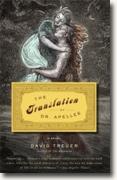The Translation of Dr. Apelles
David Treuer
book reviews:
· general fiction
· chick lit/romance
· sci-fi/fantasy
· graphic novels
· nonfiction
· audio books
· author interviews
· children's books @
curledupkids.com
· DVD reviews @
curledupdvd.com
newsletter
win books
buy online
links
home
for authors
& publishers
for reviewers

 |
The Translation of Dr. Apelles: A Love Story David Treuer Vintage Paperback 336 pages February 2008 |
|
The Translation of Dr. Apelles
For the most part, the narratives are just plain boring. The adolescent Bimaadiz and Eta discover love (carnal and romantic) through each other and predictably have a happy ending. The few antagonists who frustrate their efforts are cartoonish, their presence feeling like the author’s concession to traditional romance plots. Not that the reader takes these challenges to love seriously, as solutions are obvious and any possible tensions are resolved almost immediately. These episodes culminate in the end of the book, which is full of fantastical problems and even more absurd resolutions. While these plot devices may be theoretically appropriate to the mythic setting, they reek of unacceptable deus ex machine. The greatest challenge to Bimaadiz and Eta’s love comes from their own innocence, but these aren’t detailed, complicated characters; they’re the perfect teenagers: good—and boring—in all respects. The Apelles story is a more realized effort; Apelles’ characterization as human being and dissociated academic is successful, but the reader still has to grit his teeth to bear Treuer’s rambling about how Apelles needs love, and in accordance with that Beatles cliché, he implicitly moralizes that love is all he needs. Then, surprise! He finds love. Add in some complications about his manuscript which he silently overcomes, and you have the neat little love story. I felt cheated by the brevity of Apelles’s resolution with the only real conflict in his narrative—it was too quiet, too subtle, and didn’t show enough about the evolution of his character to warrant reading his story. The novel’s saving grace is in its creative and overall good use of language. Treuer does write poetically, and his style feels appropriate both for the mythic story of Bimaadiz and Eta as well as the cerebral journey of Apelles. Underneath the gentle, rich flow of prose are little flickers of energy which propel the lines forward, a poetry which maps well onto the storyline. But often this energy is absent and the prose is sleepy, as the language is forced to trudge through the blasé plot without any sense of life. Treuer says less than other similar postmodern works and does so with less grace, but if a reader is willing to give up engaging plot for some creative use of language, Translation Originally published on Curled Up With A Good Book at www.curledup.com. © Max Falkowitz, 2008 |
|
|
|
 Click here to learn more about this month's sponsor! |
|
| fiction · sf/f · comic books · nonfiction · audio newsletter · free book contest · buy books online review index · links · · authors & publishers reviewers |
|
| site by ELBO Computing Resources, Inc. | |
 Literature which seeks to question the triangle of readers, writers, and their books inevitably conjures up the work of Italo Calvino, particularly his “novel” of endless complexity, If On A Winter’s Night A Traveler. In his strange and wild rendering, nothing can be taken for granted anymore, and all bets on what you thought a novel could be are off. This is coupled with over ten distinct prose styles, beautiful in their own right, and amazingly all from the same pen.
Literature which seeks to question the triangle of readers, writers, and their books inevitably conjures up the work of Italo Calvino, particularly his “novel” of endless complexity, If On A Winter’s Night A Traveler. In his strange and wild rendering, nothing can be taken for granted anymore, and all bets on what you thought a novel could be are off. This is coupled with over ten distinct prose styles, beautiful in their own right, and amazingly all from the same pen.